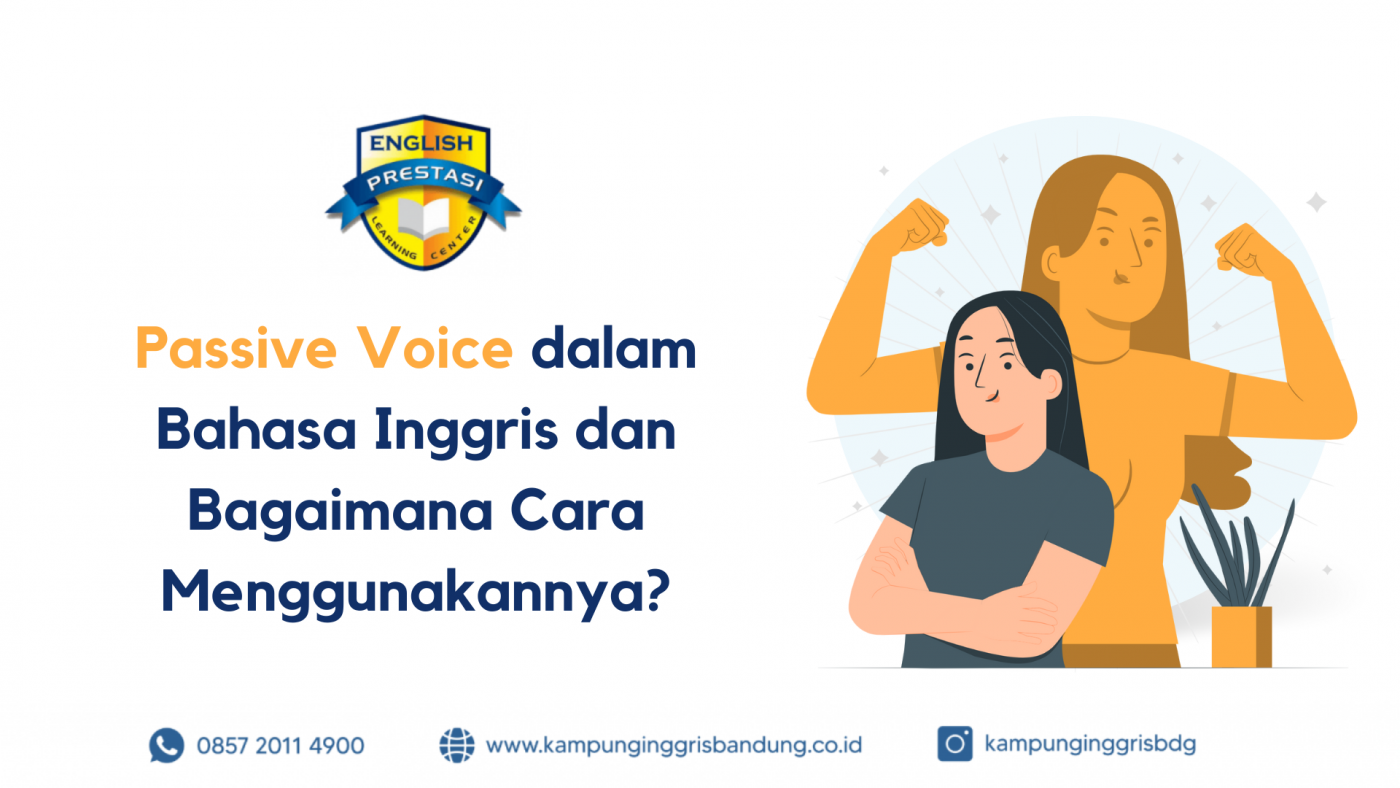Tidak ada produk di keranjang.
Grammar, Passive, Sentence Structure
Passive Voice dalam Bahasa Inggris dan Bagaimana Cara Menggunakannya?
Kampung Inggris Bandung E-PLC – Passive voice atau kalimat pasif, secara sederhana, adalah ketika sesuatu yang dilakukan oleh subjek kalimat dilakukan oleh objek sebagai gantinya. Mari kita perjelas, dalam sebuah kalimat aktif biasanya sebuah subjek yang melakukan suatu kata kerja. Sementara dalam kalimat pasif, objek lah yang melakukan kata kerja.
Objek dalam sebuah kalimat biasanya hal yang menerima tindakan. Tetapi dalam kalimat pasif, objeklah yang ‘melakukan’ tindakan tersebut.
Saat menulis dalam bentuk pasif, subjek tidak lagi melakukan suatu tindakan melainkan menjadi yang menerima tindakan tersebut. Misalnya, kalimat ‘John threw the ball’ akan menjadi ‘The ball was thrown by John.’ Dalam beberapa hal para profesional Inggris tidak menyukai penggunaan kalimat pasif tetapi tentu saja Passive Voice ini ada kegunaannya.
Contoh active-passive voice
The snake might have killed him. (Active) –> He might have been killed by the snake. (Passive)
My father had Tom wash his car. (Active) –> My father had his car washed by Tom. (Passive)
Perbedaan Active-Passive Voice
Kalimat aktif pada dasarnya adalah kebalikan dari kalimat passive. Mari kita bahas contohnya, kalimat aktif tertulis ‘Dave completed his homework.’ Dave adalah subjek, Complete adalah kata kerja, dan Homework adalah objek yang diselesaikan.
Sekarang, coba kita ubah ke kalimat dalam bentuk pasif menjadi, The homework was completed by Dave. Dalam hal ini, Homework adalah objek yang melakukan, Complete tentu saja masih kata kerja, tetapi Dave, subjek, sekarang memiliki kata kerja yang dilakukan padanya.
Keduanya baik aktif maupun pasif secara tata bahasa benar, tetapi Active Voice sedikit lebih kuat dalam penyampaian pesannya karena jelas siapa yang melakukan apa.
Kapan Menggunakan Passive Voice?
Passive voice dapat digunakan secara efektif dalam skenario tertentu. Jika, misalnya, subjeknya tidak diketahui atau seseorang yang ingin kita sembunyikan, maka kalimat pasif berfungsi dengan baik. Jika kamu sedang menulis novel misteri misalnya, dan belum mau mengungkapkan seseorang, maka kamu bisa menggunakan Passive Voice untuk menarasikan kalimatnya.
Kalimat pasif juga merupakan cara yang bagus untuk menekankan subjek di akhir kalimat. Sesuatu seperti “The shots had been fired by Tim” menciptakan suasana yang lebih tegang daripada menggunakan alternatif kalimat aktif “Tim fired the shots”. Beberapa kalimat dalam bahasa Inggris juga selalu disajikan dalam bentuk pasif seperti “The book was written by …” hanyalah salah satu contoh ketika kalimat pasif seperti ini banyak digunakan.
Passive Voice dapat digunakan ketika:
- Ketika agen/subjek (orang yang melakukan tindakan) tidak diketahui, tidak penting, atau jelas dari konteksnya.
Jane was shot. (We don’t know who shot her.)
This house was built in 1815. (unimportant agent).
- Untuk membuat pernyataan yang lebih sopan atau formal.
The trees haven’t been watered. (more polite)
You haven’t watered the trees. (less polite)
- Ketika tindakan lebih penting daripada agen, seperti dalam proses, instruksi, peristiwa, laporan, berita utama, item berita, dan iklan.
60 people were killed in shootings across Chicago between Friday and Monday morning.
- Untuk memberi penekanan pada agen/subjek
The new bar will be opened by Sean.
Aturan umum yang berlaku, active voice hampir selalu lebih disukai dari pada passive voice dalam bahasa Inggris, karena active memiliki bentuk yang jauh lebih ringkas dan jelas untuk mengungkapkan apa yang terjadi. Kita perlu berhati-hati ketika menggunakan passive voice karena kemungkinan para pembaca dan pendengar salah tafsir bisa sangat terjadi.
Aturan dalam Active-Passive Voice
V1: Base Form of Verb
V2: Past Simple
V3: Past Participle
- Active vs Passive Voice for Present Simple Tense
Active voice: S + V1
Passive voice: S + am/ is/ are + V3
I make a cake. (Active)
A cake is made by me. (Passive)
- Active vs Passive Voice for Present Continuous Tense
Active voice: S + am/is/are + V-ing
The passive: S + am/ is/ are + being + V3
They are planting some trees. (Active)
Some trees are being planted. (Passive)
- Active vs Passive Voice for Present Perfect Tense
Active voice: S + have/ has + V3
Passive voice: S + have/ has + been + V3
Someone has eaten my muffin. (Active)
My muffin has been eaten. (Passive)
- Active and Passive Voice for the Present Perfect Continuous
Active voice:S + have/ has + been + V-ing
The Passive: S + have/ has + been + being + V3
Lisa has not been practicing English. (Active)
English has not been being practiced by Lisa. (Passive)
- Active and Passive Voice for the Future with WILL
Active voice: S + will/ shall + V1
Passive voice: S + will be + V3
My parents will take us to the park. (Active)
We will be taken to the park by our parents. (Passive)
- Active and Passive Voice for the Future with BE GOING TO
Active voice: S + am/ is/ are + going to + V1
Passive voice: S + am/ is/ are going to be + V3
I am going to read the book. (Active)
The book is going to be read by me. (Passive)
- Active vs Passive Voice for the Future Continuous with WILL
Active Voice: S + will/ shall + be + V-ing
The Passive: S + will/ shall + be + being + V3
She will be taking care of her children at this time tomorrow. (Active)
Her children will be being taken care of at this time tomorrow. (Passive)
- Active and Passive Voice for the Future Continuous with BE GOING TO
Active voice: S + am/ is/ are + going to + be + V-ing.
Passive voice: S + am/ is/ are + going to + be + being + V3.
Linda is going to be preparing dinner. (Active)
Dinner is going to be being prepared by Linda. (Passive)
- Active vs Passive Voice for the Future Perfect with WILL
Active voice: S + will + have + V3
Passive voice: S + will have been + V3
I will have finished my report by the end of this month. (Active)
My report will have been finished by the end of this month.. (Passive)
- Active vs Passive Voice for the Future Perfect with BE GOING TO
Active voice: S + am/ is/ are + going to + have + V3
The Passive: S + am/ is/ are + going to + have + been + V3
I am going to have finished my report by the end of this month. (Active)
My report is going to have been finished by the end of this month. (Passive)
- Active and Passive Voice for the Future Perfect Continuous with WILL
Active voice: S + will + have + been + V-ing
The Passive: S + will + have + been + being + V3
I will have been teaching English for 5 years by next week. (Active)
English will have been being taught by me for 5 years by next week. (Passive)
- Active vs Passive Voice for the Future Perfect Continuous with BE GOING TO
Active voice: S + am/ is/ are + going to + have + been + V-ing.
The Passive: S + am/ is/ are + going to + have + been + being + V3.
He is going to have been watching TV. (Active)
TV is going to have been being watched by him. (Passive)
- Active and Passive Voice for the Past Simple
Active voice: S + V2
Passive voice: S + was/ were + V3
I visited my uncle last week. (Active)
My uncle was visited by me last week. (Passive)
- Active and Passive Voice for the Past Continuous
Active voice: S + was/ were + V-ing
Passive voice: S + was/ were + being + V3
Sam was delivering the letters to the department. (Active)
The letters were being delivered to the department by Sam. (Passive)
- Active vs Passive Voice for the Past Perfect
Active voice: S + had + V3
The Passive: S + had been + V3
He had read the book before Nick came. (Active)
The book had been read before Nick came. (Passive)
- Active vs Passive Voice for the Past Perfect Continuous
Active voice: S + had + been + V-ing
Passive voice: S + had + been + being + V3
I had been typing the essay for 3 hours before you came yesterday. (Active)
The essay had been being typed for 3 hours before you came yesterday. (Passive)
- Active and Passive Voice for the Future in the Past (Would)
Active voice: S + would + V1
The Passive: S + would + be + V3
She would type the letters. (Active)
The letters would be typed by her. (Passive)
- Active and Passive Voice for the Causative Form
Active voice:
S + have/ has somebody + V1 + something
S + get(s) somebody + to + V1 + something
Passive voice:
S+ have/ has/ get(s) something + V3 + (by + someone).
My father had Tom wash his car. (Active)
My father had his car washed by Tom. (Passive)
- Active and Passive Voice for Modal Verbs (Present)
Active voice: S + modal verb + V1
The Passive: S + modal verb be + V3
You can solve the problem. (Active)
The problem can be solved. (Passive)
- Active vs Passive Voice for Modal Verbs (Present Perfect)
Active voice: S + modal verb + have + V3
The Passive: S + modal verb + have + been + V3
The snake might have killed him. (Active)
He might have been killed by the snake. (Passive)
Baca juga: Tipe-tipe Kalimat ‘Conditionals Sentence’ dalam Grammar Bahasa Inggris

